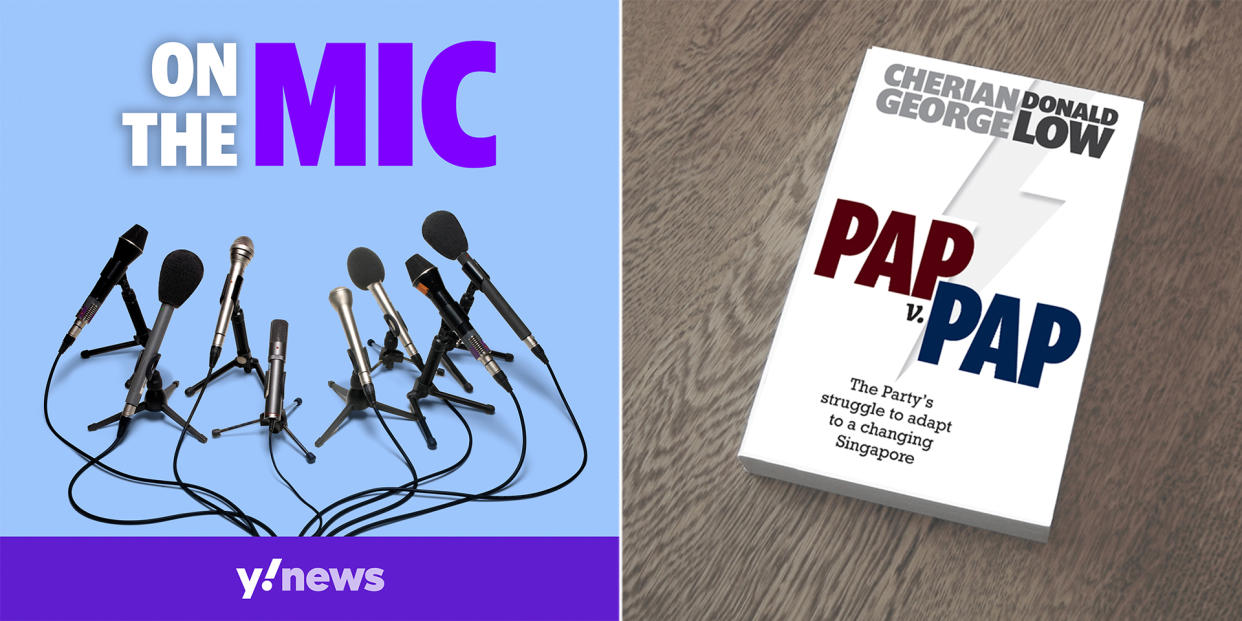On The Mic: 5 choice quotes from 'PAP vs PAP' by Cherian George and Donald Low

LISTEN: Use the player above to listen to our full interview with media academic Cherian George and economist Donald Low
SINGAPORE — In our latest episode of the On The Mic podcast, academics Cherian George and Donald Low spoke about their latest book “PAP vs PAP”.
The anthology draws on both writers’ body of work commenting on the Singapore government and politics, and also features new essays.
Yahoo News Singapore was given a preview of the book and we’ve selected some engaging quotes relating to the subjects raised by the authors.
1. On the PAP’s need for internal reform
In the book’s preface, George and Low state that a “reformed PAP that is comfortable with political competition” would be a good thing for the country as well as the party.
They write:
“It will require moral courage from reform-minded PAP leaders, not just to resist the siren calls to exploit the inherent unfairness of Singapore’s illiberal democracy, but also to remodel the system. This book on its own will not change hearts and minds within the PAP leadership. But we hope that it will spark conversations and spur action among Singaporeans who recognise the value of pressing for a fairer, more open and inclusive political system. Political parties will respond only to ideas that are publicly and persistently championed. An engaged citizenry will be the decisive factor determining the outcome of the battle for the soul of the PAP.”
2. On the use of POFMA during GE2020
Commenting on the Protection from Online Falsehoods and Manipulation Act (POFMA) and the many POFMA correction orders issued ahead of the 2020 General Election, the writers state:
“Even if objective voters conclude that every one of the POFMA directives was a justified move against false statements of fact that harmed the public interest — and that’s a big ‘if’ — they would still recognise POFMA as a one-sided law, since it can be triggered only by senior officials appointed by PAP Ministers. Opposition candidates could also be targets of false statements of fact harmful to the public interest. Yet they cannot rely on POFMA to set the record straight. With mainstream media already biased in favour of the ruling party, POFMA compounds doubts about the fairness of this exceptionally media-reliant electoral contest.”
3. On the lure of populism
In a chapter titled “Riding the populist tiger”, the authors observe that the PAP has in recent times adopted the “populist methods and tropes associated with insurgent anti-establishment groups”. The pair also note that the party of Singapore’s founding prime minister “wasn’t just less populist, it was actively anti-populist”.
They write:
“Though the bane of the PAP’s founders, the populist temptation has been hard to resist. After all, populism is a set of practices used for the simple reason that they achieve results. It is, for example, easier to invent scapegoats than solutions. It is also much simpler to activate tribal loyalties than to promote multi-cultural and global solidarity. Populism has been described as an empty ideology, which is why it is found both on the left and the right of the political spectrum. And this may also be why even a centrist, moderate and traditionally anti-populist PAP has been drawn to some elements of the populist playbook.”
4. Adapting to a pandemic-disrupted world
The authors also address the challenges facing the PAP in trying to adapt to a pandemic-disrupted world. They write:
“A more challenging set of policy issues is involved in adapting the social compact for a pandemic-disrupted world after GE2020. While the supplementary Budget measures rolled out in response to the pandemic-induced recession were laudable, these were emergency measures providing short-term relief to workers and employers. They did not represent a significant shift in long-held governmental assumptions on the relationship between growth and equality, the impact of social protection on economic competitiveness, and the appropriate balance between individual responsibility and public provision.”
5. On activism in Singapore
As George notes in a chapter titled “Passion made possible – or punishable?”, while Singapore now prides itself on promoting the arts and social engagement, it still “draws the line at public deliberation that could create a more democratic culture”.
He states:
“There are strong inducements for groups to stay within their functional niches, and disincentives against playing a wider role within the sphere of public deliberation. Thus, nature and heritage conservation groups are fine if they generate lively community conversations, but not so welcome when they encroach into the public deliberation space and challenge urban planning decisions. In academia, universities are encouraged to pursue globally recognised excellence, but cautioned against cultivating public deliberation. The boundaries are marked with somewhat arbitrary labels. If it’s kosher, it’s called research impact or knowledge transfer; if it’s not, it’s called activism, agitation or partisan politics.”
“PAP vs PAP” is available for pre-order at: books.academia.sg
Stay in the know on-the-go: Join Yahoo Singapore's Telegram channel at http://t.me/YahooSingapore
Related story:
PAP reform will benefit both party and Singapore, say academics in new book
More podcast episodes:
On The Mic: Environmental lessons from the COVID-19 pandemic
On The Mic: GE2020 — Kenneth Jeyaretnam of the Reform Party
On The Mic: GE2020 – Kumaran Pillai of the Progress Singapore Party
On The Mic: GE2020 – Ravi Philemon of Red Dot United
On The Mic: GE2020 — Jose Raymond of the Singapore People's Party
On The Mic: Father’s Day special — What’s it take to be a good dad?
On The Mic: Data security amid a pandemic – Who can we trust?
On The Mic: Dealing with family violence during the COVID-19 pandemic (Part 2)
On The Mic: Family violence amid the COVID-19 pandemic (Part 1)



